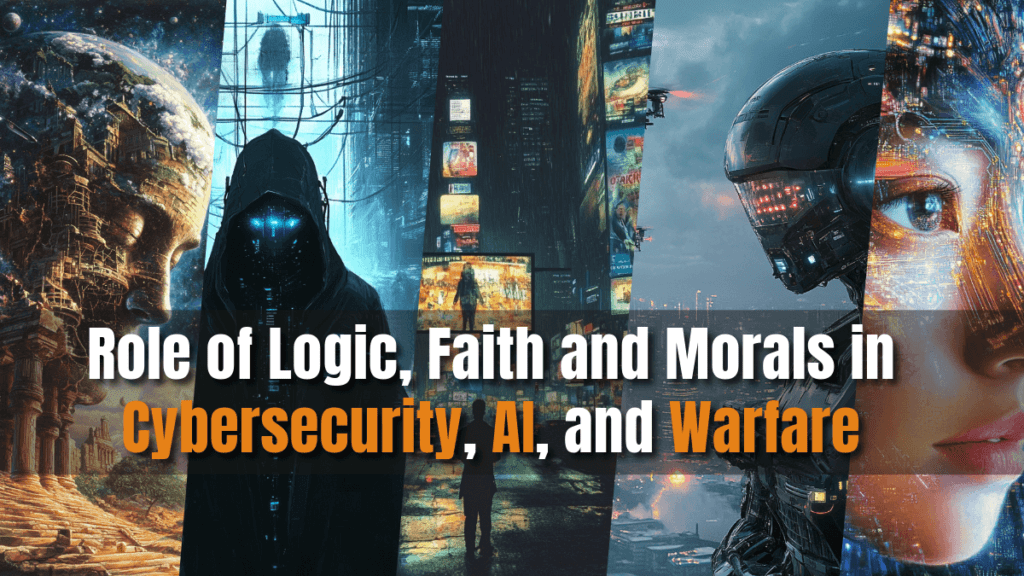Role of Logic, Faith and Morals in Cybersecurity, AI, and Warfare
Introduction
In an age of rapid technological evolution, where Artificial Intelligence (AI), cybersecurity, and psychological warfare shape global power dynamics, it is imperative to ground these advances in ethical and philosophical foundations. The Vatican’s insights into AI emphasize the irreplaceable role of human intelligence, moral responsibility, and the necessity of aligning technology with the common good. This whitepaper explores why both logic and faith are critical components in the future of cybersecurity, marketing, psychological operations (psyops), deception, AI, and unconventional warfare. In order to establish the role of Logic, Faith and Morals in Cybersecurity, AI, and Warfare.

I. The Ethical Imperative: Logic and Faith as Pillars of Human Progress
The Vatican underscores that AI is a product of human intelligence and should not be mistaken for true cognition. AI lacks moral discernment, wisdom, and an understanding of human dignity. This distinction is crucial when addressing threats posed by cyber warfare, misinformation, and cognitive warfare. Without faith-based ethical considerations, technological advancements risk being weaponized for control, deception, and societal manipulation.
Logic, grounded in reason and empirical knowledge, ensures that cybersecurity frameworks remain robust against adversarial threats. However, faith provides the moral compass necessary to wield technology responsibly, ensuring that AI serves humanity rather than exploits it. The combination of these forces prevents the emergence of a technocratic paradigm that prioritizes efficiency over human dignity.
The Role in Preventing a Collapse in AI Ethics
- Ensuring Transparency and Accountability in AI Systems
- Promoting Digital Literacy and Critical Thinking
- Upholding Ethical Standards and Moral Responsibility
- Safeguarding Human Dignity and Freedom
II. Cybersecurity and the Need for Ethical Restraint
Cybersecurity operates at the intersection of logic and faith. The logic-driven aspect of cybersecurity involves technical expertise, encryption, and advanced defensive strategies. However, faith-based ethics are needed to ensure that security measures respect privacy, human rights, and the common good. The Vatican warns of AI-driven surveillance systems that could violate human dignity, underscoring the necessity for restraint in cyber capabilities.
The Role of Faith in Preventing Cyber Tyranny:
-
Ethical AI governance to prevent mass surveillance abuses.
-
Limiting state and corporate overreach in digital privacy.
-
Ensuring cyber defense strategies align with human dignity.
-
Promoting cybersecurity education rooted in ethical responsibility.
III. Marketing, Psyops, and Cognitive Warfare: Controlling the Narrative
In modern warfare, the battle for perception is as crucial as physical conflict. AI-driven psychological operations (psyops) and cognitive warfare exploit human behavior, manipulating narratives to achieve strategic objectives. The Vatican warns against AI’s role in misinformation, deepfakes, and deception, emphasizing that human relationships should not be replaced by artificial engagement.
Faith provides a counterbalance by reinforcing objective truth and ethical responsibility in information warfare. If AI and machine learning models are leveraged for mass manipulation, the erosion of trust in institutions becomes inevitable, leading to societal instability.
The Role of Faith in Countering Cognitive Warfare:
-
Establishing truth as an immutable principle in AI-generated content.
-
Resisting manipulative marketing and propaganda techniques.
-
Promoting critical thinking to discern deception and misinformation.
-
Ensuring AI respects human dignity rather than exploiting psychological vulnerabilities.
IV. The AI Arms Race: Ethics in Unconventional Warfare
The Vatican explicitly warns against the militarization of AI, particularly the development of Lethal Autonomous Weapon Systems (LAWS). These systems, devoid of human conscience, pose significant risks in warfare. The ability to take life must remain a human decision, governed by ethical and moral reasoning. Without faith-based moral constraints, AI-driven warfare could escalate beyond human control.
The Role of Faith in AI Warfare:
-
Prohibiting fully autonomous lethal weapons that operate without human oversight.
-
Implementing ethical AI frameworks that prioritize de-escalation over destruction.
-
Establishing international guidelines grounded in the sanctity of human life.
-
Ensuring warfare strategies consider long-term human consequences rather than short-term tactical advantages.
V. AI, Deception, and the Struggle for Truth
One of the greatest threats AI poses is its ability to fabricate reality through deepfakes, misinformation campaigns, and automated disinformation networks. The Vatican identifies deception as a grave moral issue that threatens human relationships and societal trust. Cyber deception is already a weapon in statecraft, used to influence elections, destabilize economies, and manipulate perceptions. Faith provides an anchor to objective truth, ensuring that technology serves transparency rather than falsehood.
The Role of Faith in AI Ethics:
-
Ensuring AI transparency and explainability to prevent deception.
-
Promoting digital literacy to combat AI-generated misinformation.
-
Encouraging accountability in AI systems to prevent manipulation.
-
Upholding the principle that technology should serve truth, not distort it.
VI. Conclusion: The Future Depends on Moral and Logical Balance
As AI, cybersecurity, and cognitive warfare become defining elements of the 21st century, logic alone is insufficient to guide humanity toward a just and ethical future. Faith provides the ethical framework necessary to prevent AI from being weaponized against human dignity. The Vatican’s analysis serves as a crucial reminder that human intelligence—encompassing logic, faith, and morality—must govern AI, not the other way around thus the need to establish robust roles of Logic, Faith and Morals in Cybersecurity, AI, and Warfare.
Key Takeaways:
-
Cybersecurity must integrate ethical considerations to prevent AI-driven surveillance and digital oppression.
-
AI in psyops and cognitive warfare must be regulated to protect truth and prevent mass manipulation.
-
Lethal Autonomous Weapon Systems must be banned to ensure warfare remains a human ethical decision.
-
AI-generated deception must be countered by faith-based commitment to truth.
-
The ethical development of AI requires a balance between logic and faith, ensuring human dignity remains paramount.
As AI continues to reshape global power structures, only a principled fusion of logic and faith will ensure that technology serves humanity rather than subjugates it. The future depends on whether we choose to wield AI as a force for ethical progress—or allow it to become an instrument of control and deception.





